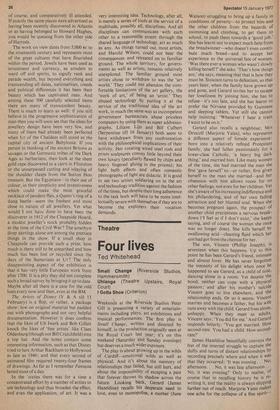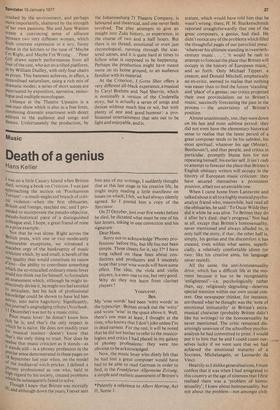Theatre
Four lives
Ted Whitehead
Small Change (Riverside Studios, Hammersmith) Uhlanga (Theatre Upstairs, Royal Court) I Gotta Shoe (Criterion)
Weekends at the Riverside Studios Peter Gill is presenting a variety of entertainments including plays, art exhibitions and musical performances. The first play is Small Change, written and directed by himself, in the production originally seen at the Royal Court last year; it's on this weekend (Saturday and Sunday evenings) but deserves a much wider exposure.
The play is about growing up in the wilds of Cardiff—emotional wilds as well as physical. And it's about the memory of relationships that failed, but still hurt, and about the impossibility of escaping a past that forever throws its shadow across the future. Looking back, Gerard (James Hazeldine) recalls his desperate need to love, even to monopolise, a mother (June
Watson) struggling to bring up a family in conditions of poverty—to protect him and the other children from the hazards of swimming and climbing, to get them to school, to push them towards a 'good job.' She has learnt not to expect much help from the breadwinner—who doesn't even contribute much bread—and to accept her experience as the universal fate of women. 'Was there ever a woman who wasn't slowly killing herself?' she asks. 'That's how things are,' she says, meaning that that is how they must be. Stoicism turns to defeatism, so that years later, when the family have grown UP and gone, and Gerard invites her to escape her loneliness by joining him, she has to refuse--it's too late, and she has learnt to prefer the Nirvana provided by Guinness and sleeping tablets. Yet still she cannot help insisting: 'Whenever I hear a train want to be on it.'
Gerard also recalls a neighbour, Mrs Driscoll (Marjorie Yates), who represents a different aspect of female experience: born into a relatively refined Protestant family, she had fallen passionately for a lower-clasts Catholic, 'a heavy big dark thing,' and married him. Like many women of the time, she had married the man she first 'gave herself' to—or rather, first given herself to the man she married—and her obsession with him allows room for nn other feelings, not even for her children. Yet she's aware of his increasing indifference and his philandering, and of her own fading attraction and her blunted soul. When she becomes pregnant again, the prospect of another child precipitates a nervous breakdown CI feel as if I don't exist,' she keeps saying, and of course the woman she once was no longer does). She kills herself by swallowing acid—cleaning fluid which her son had got from the chemist for her.
The son, Vincent (Phillip Joseph), iS seventeen when this happens. Up to this point he has been Gerard's friend, intimate and almost lover. He has never forgotten the intensity of his delight when 'once be happened to see Gerard, as a child of nine, dancing alone in a room. Yet despite the bond, neither can cope with a Physical passion; and after his mother's suicide Vincent goes to live elsewhere, and the relationship ends. Or so it seems. Vincent marries and becomes a father, but his wife runs away with the child. Gerard lives alone, unhappy. When they meet as adults, Vincent says: 'You did for me.' And Gerard responds bitterly: 'You got married. How second-rate. You had a child. How secondrate!'
James Hazeldine beautifully conveys the fret of the internal struggle to capture the shifts and turns of distant relationships bY recording precisely where and when it was that they occurred: 'It was evening ... No, afternoon. . . No, it was late afternoon. No, No, it was evening!' Only to realise, ut course that in recalling history he is rewriting it, and the reality is always slipping further out of reach. Marjorie Yates mikes one ache for the collapse of a fine spirit
crushed by the environment, and perhaps More importantly, shattered by the strength of her own passions. She and June Watson create a convincing sense of alliance between two very different women, which finds concrete expression in a wry, funny dance in the kitchen to the tune of 'Maybe I'M Right, and Maybe I'm Wrong. . .' Peter Gill draws superb performances from all four of the cast, who act on a tilted platform, lit by William Dudley, with only four chairs as props. This bareness achieves, in effect, a streamlined naturalism, using a rich mix of dramatic modes; a series of short scenes are Punctuated by exposition, narrative, monologue and multiple monologues.
Uhlanga at the Theatre Upstairs is a one-man show which is also in a free form, combining dramatic enactment with direct address to the audience and songs and dances. Unfortunately the production, by
the Johannesburg 71 Theatre Company, is laboured and theatrical, and one never feels involved. The play attempts to give an insight into Zulu history, or experience, in the course of two and a half hours. But there is no thread, emotional or even just chronological, running through the scattered scenes, and it is quite hard at times to follow what is supposed to be happening. Perhaps the production might have meant more on its home ground, to an audience familiar with its material.
At the Criterion, I Gotta Shoe offers a very different all-black experience, a musical by Caryl Brahms and Ned Sherrin, which is nominally a version of the Cinderella story, but is actually a series of songs and darices without much bite or wit, but with plenty of zest and good humour: a professional entertainment that sets out to be light and enjoyable, and is.



































 Previous page
Previous page